Post by ferrari512s on Jun 25, 2014 5:40:45 GMT -5

Reposted completely from Source: en.wikipedia.org/wiki/Richard_Petty

Richard Lee Petty (born July 2, 1937) is a former NASCAR driver who raced in the Strictly Stock/Grand National Era and the NASCAR Winston Cup Series. "The King", as he is nicknamed, is most well known for winning the NASCAR Championship seven times...

(Dale Earnhardt is the only other driver to accomplish this feat),[1] winning a record 200 races during his career,[1] winning the Daytona 500 a record seven times, and winning a record 27 races[1] (ten of them consecutively) in the 1967 season alone.

(A 1972 rule change eliminated races under 250 miles (400 km) in length, reducing the schedule to 30 [now 36] races.) Statistically he is the most accomplished driver in the history of the sport and is one of the most respected figures in motorsports as a whole.
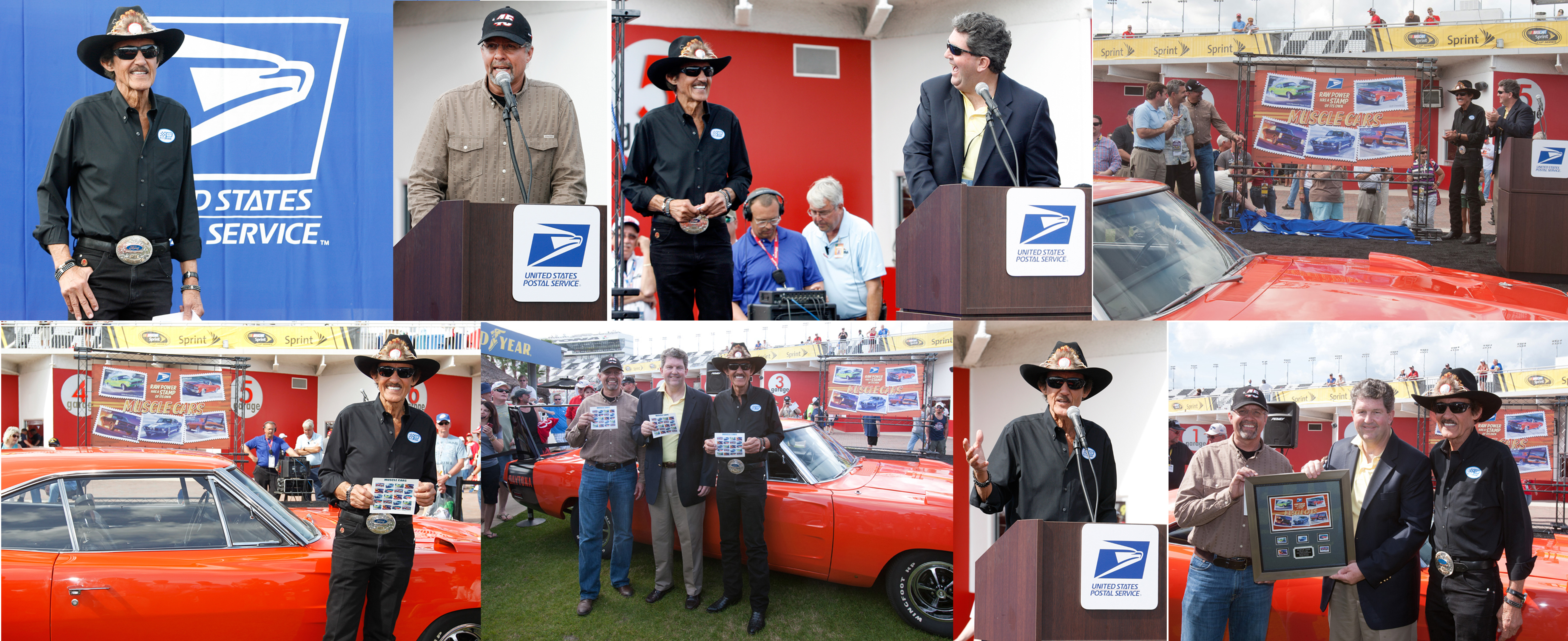
He also collected a record number of poles (127) and over 700 top-ten finishes in his 1,184 starts, including 513 consecutive starts from 1971–1989. Petty was the only driver to ever win in his 500th race start, until Matt Kenseth joined him in 2013. Petty is a member of the inaugural class of the NASCAR Hall of Fame. He was inducted into the Hall in 2010.[2]

Petty is a second generation driver. His father, Lee Petty, won the first Daytona 500 in 1959 and was also a 3 time NASCAR champion. Richard's son Kyle was also a well-known NASCAR driver. Richard's grandson, Adam, was killed in an accident at New Hampshire International Speedway on May 12, 2000, five weeks after the death of Lee Petty.

Adam's brother Austin works on day-to-day operations of the Victory Junction Gang Camp, a Hole in the Wall Gang Camp established by the Pettys after Adam's death. Petty married Lynda Owens (who died on March 25, 2014 at her home in Level Cross, North Carolina after a long battle with cancer, at age 72) in 1958.[3][4]

They had four children: Kyle Petty, Sharon Petty Farlow, Lisa Petty Luck and Rebecca Petty Moffit.[5] The family resides in Petty's home town of Level Cross, North Carolina and operates Richard Petty Motorsports. The Richard Petty Museum was formerly in nearby Randleman, North Carolina but moved back to its original location in March 2014.

Racing career
Petty was born in Level Cross, North Carolina to Elizabeth (née Toomes) and Lee Arnold Petty, also a NASCAR driver, and the older brother of Maurice Petty.[6] He began his NASCAR career on July 18, 1958, 16 days after his 21st birthday.

His first race was held at CNE Stadium in Toronto, Canada. In 1959, he was named NASCAR Rookie of the Year, after he produced 9 top 10 finishes, including six Top 5 finishes.[citation needed]

The 1960s

Petty's famous Plymouth Superbird, on display at The Richard Petty Museum in Randleman, North Carolina
In 1960, he finished 2nd in the NASCAR Grand National Points Race. 1963 was his breakout year, winning at tracks like Martinsville and Bridgehampton. In 1964, driving a potent Plymouth with a new Hemi engine, Petty led 184 of the 200 laps to capture his first Daytona 500, en route to 9 victories, earning over $114,000 and his first Grand National championship.

Joining in the Chrysler boycott of NASCAR due to the organizing body's ban of the Hemi engine, Petty spent much of 1965 competing as a drag racer. He crashed his car at the Southeastern Dragway, in Dallas, Georgia, on February 28, 1965, killing a six-year old boy, Wayne Dye, and injuring seven others.[7][8] Petty, his father Lee, and Chrysler Corporation faced lawsuits totaling more than $1 million.[9]
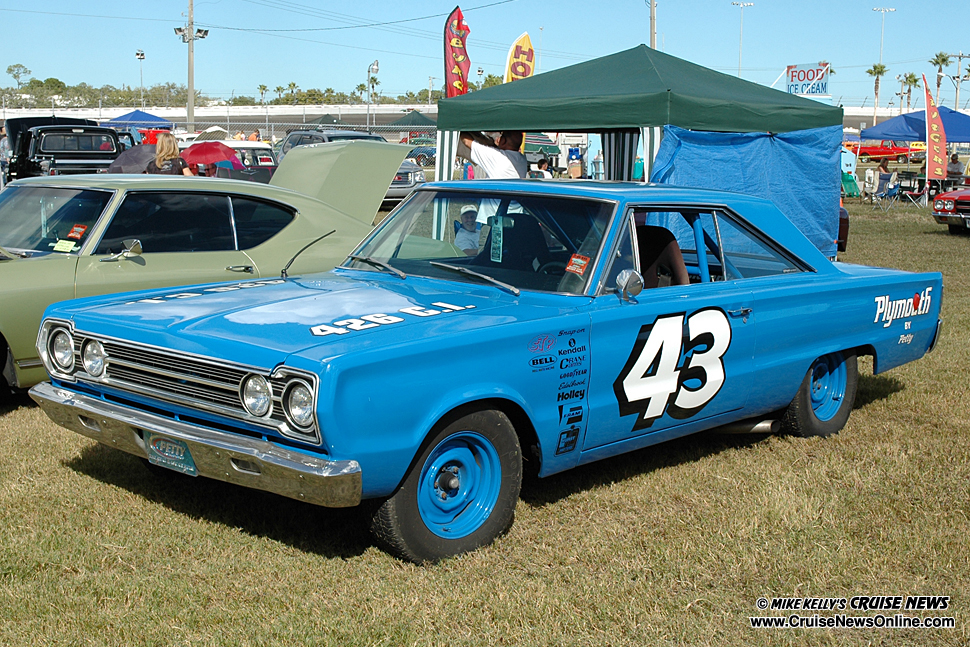
On February 27, 1966, Richard Petty overcame a 2-lap deficit to win his second Daytona 500 when the race was stopped on lap 198 of 200 because of a thunderstorm. This made him the first driver to win the event twice. 1967 was a milestone year.
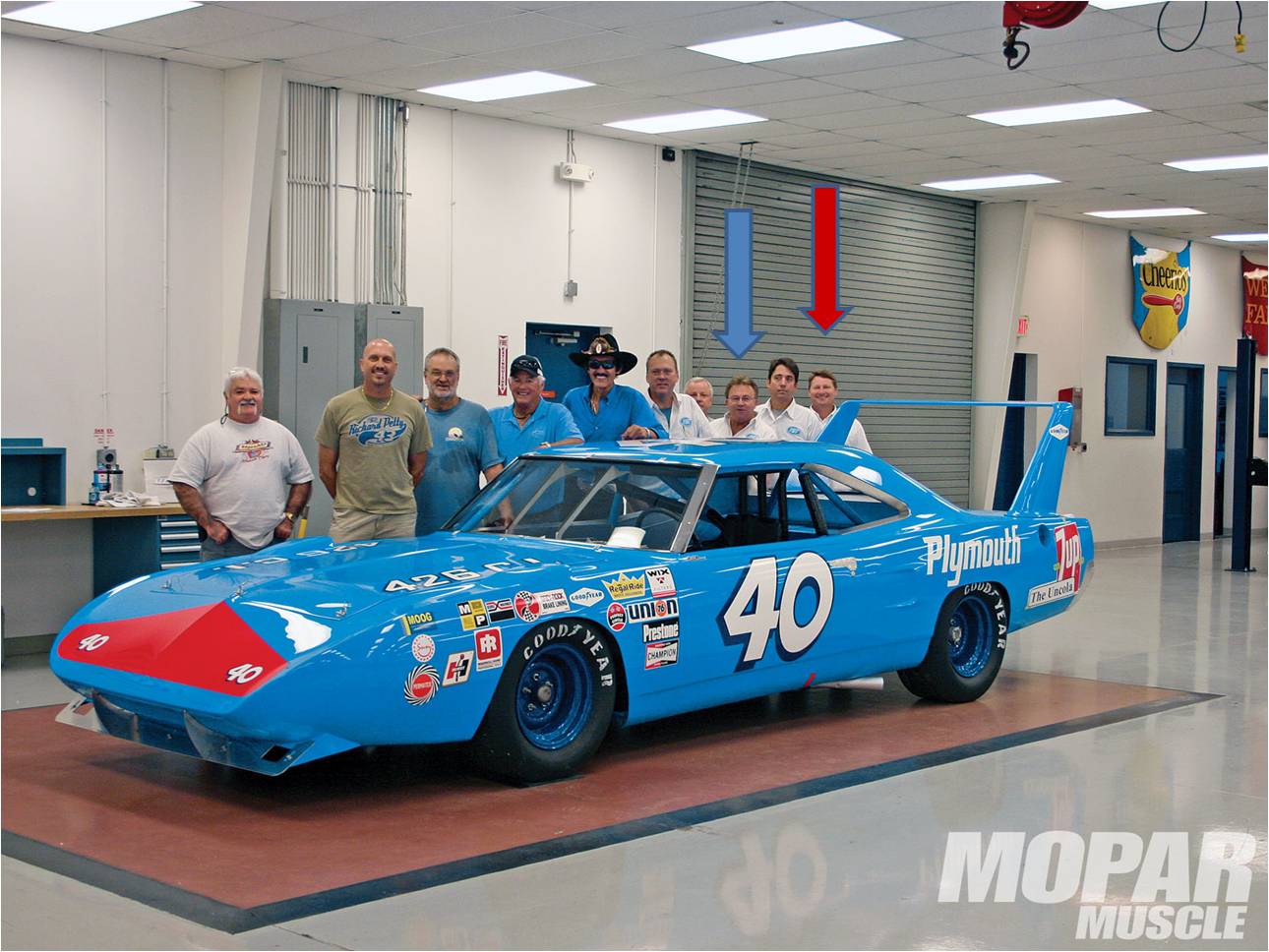
In that year, Petty won 27 of the 48 races he entered, including a record 10 wins in a row (between August 12 and October 1, 1967). He won his second Grand National Championship. One of the 27 victories was the Southern 500 at Darlington, which would be his only Southern 500 victory.

His dominance in this season earned him the nickname "King Richard". He had previously been known as "the Randleman Rocket".[citation needed]

In 1969 Petty switched brands to Ford, due to his belief the Plymouth was not competitive on super-speedways; he wanted a slippery Dodge Daytona but Chrysler executives insisted he stay with Plymouth.
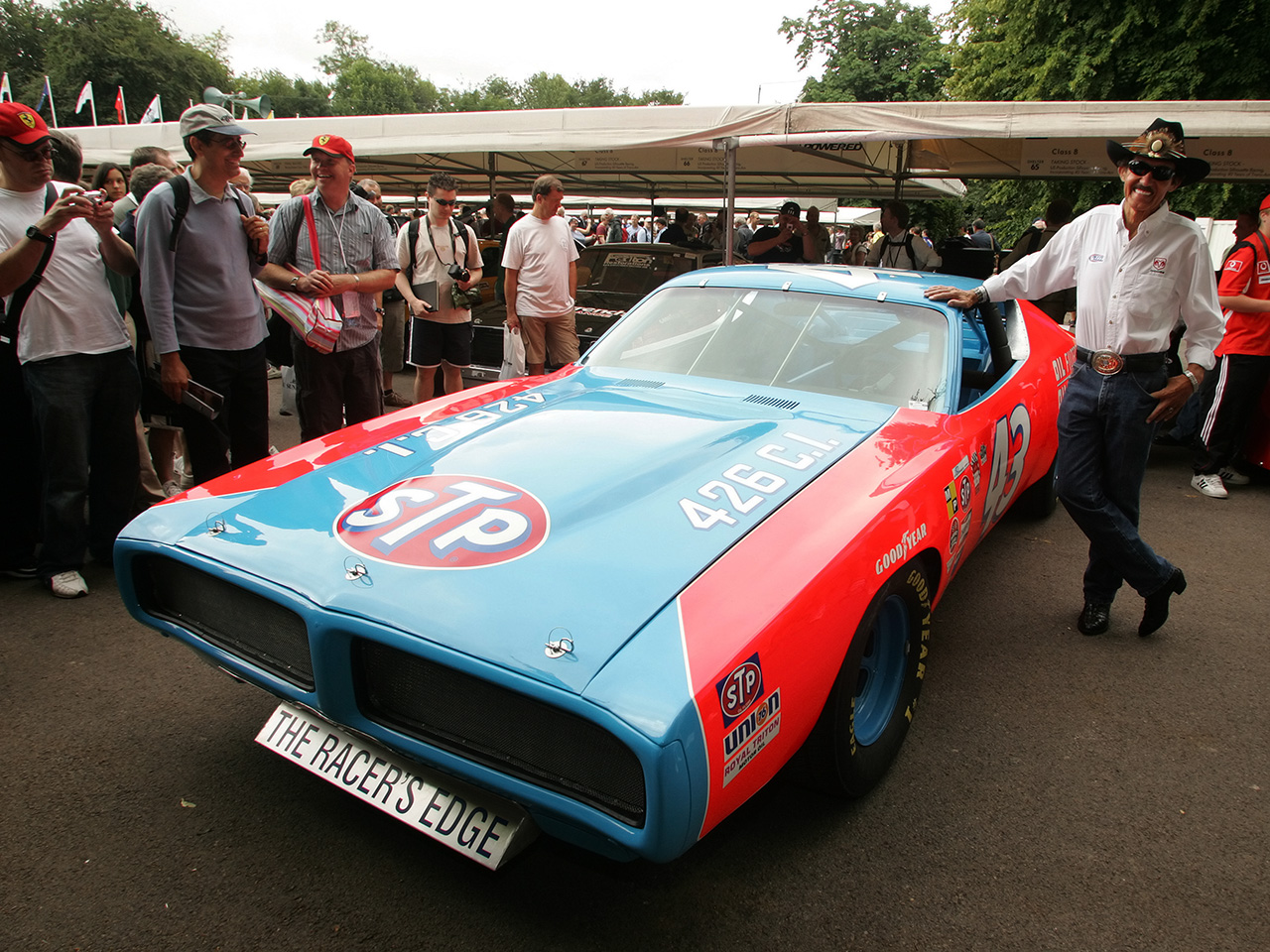
He would win 10 races and finish second in points. Won back in 1970 by the sleek new Plymouth Superbird with shark nose and goalpost wing, Petty returned to Plymouth for the 1970 season. This is the car in which Petty is cast in the 2006 Pixar film Cars, in which Richard and Lynda Petty had voice roles.

The 1970s

Petty's IROC Porsche 911 from the 1970s

Petty's car used for his 1979 Daytona 500 win, on display at Daytona USA

1983 racecar
On February 14, 1971, Petty won his third Daytona 500, driving a brand-new (for 1971) Plymouth Road Runner and beating team mate, Buddy Baker, by little more than a car length en route to another historic year, making him the first driver to win the event three times.

He won 20 more races, became the first driver to earn more than $1 million in career earnings, and claimed his third Grand National Championship. At the end of the 1971 season Chrysler told the Pettys they would no longer receive direct factory funding support, causing the Petty team great concern.

In 1972, STP (motor oil company) began what would turn into a successful 28-year sponsorship arrangement with Petty, however it marked the end of Petty's famous all "Petty Blue" paint job.
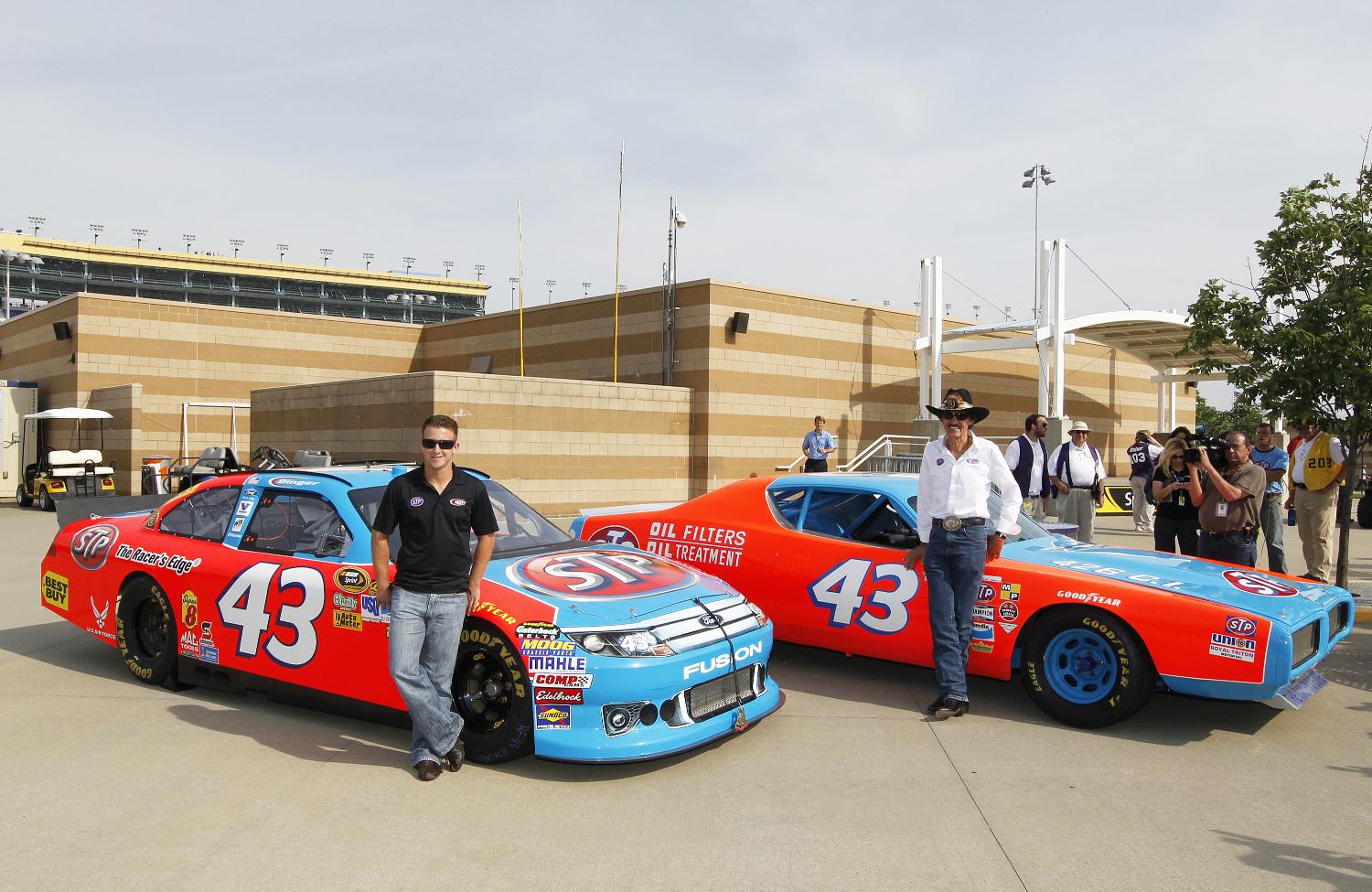
STP at first insisted on an all STP orangish-red color for the cars, but Petty balked, and after an all-night negotiation session the familiar STP orange/Petty blue paint scheme was agreed to as a compromise that would find its way to all STP racing operations, most notably Gordon Johncock's 1982 Indianapolis 500 winner.
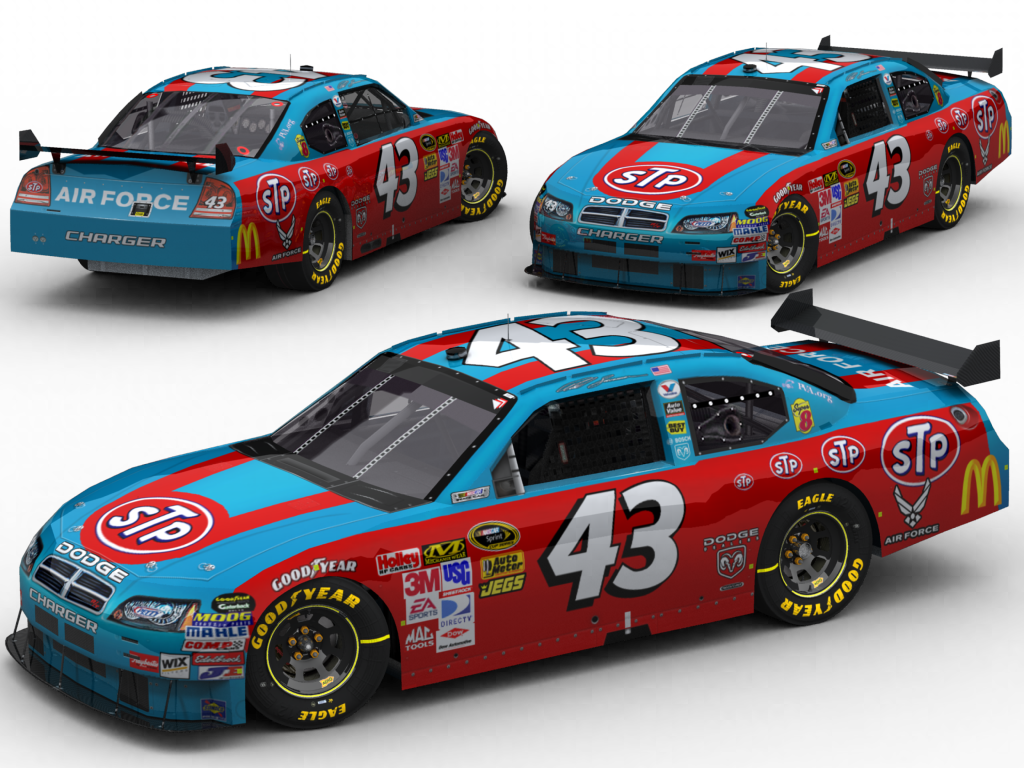
Petty won his 4th Winston Cup Championship, thanks to his 28 top-10 finishes, including 25 top-5 finishes and 8 victories. 1972 was a year of change in other ways, as it was the last year Petty would campaign a Plymouth based race car; as in the middle of the year Petty debuted and drove a newly built 1972 Dodge Charger in a few races (winning one of them), as Petty believed the car to have a slight aero advantage over the Plymouth body style.

On February 18, 1973, in a driver’s duel, Petty, in a newly built 1973 Dodge Charger (a body style he would use exclusively until the end of 1977) outlasted Baker (now with the K&K Insurance Dodge race team) to win his fourth Daytona 500 after Baker's engine gave out with six laps left. One year later, Petty won the Daytona "450" (shortened 20 laps {50 mi/80 km} due to the energy crisis) for the fifth time en route to his fifth Winston Cup Championship.
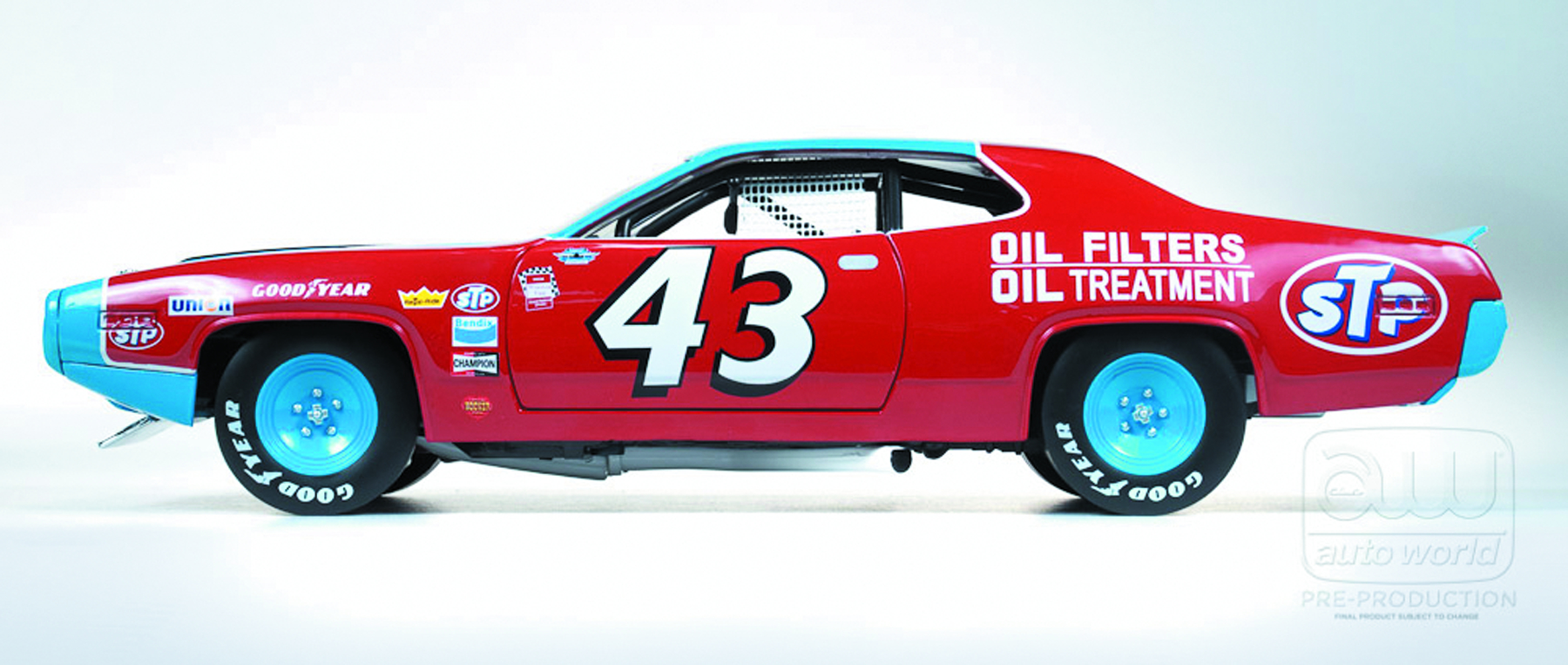
The year 1975 was another historic year for Petty, as he won the World 600 for the first time in his career, one of 13 victories en route to his sixth Winston Cup. The 13 victories is a modern (1972 to present) NASCAR record for victories in a season, and was tied in 1998 by Jeff Gordon, although Gordon won 13 out of 33 races, compared to Petty's 13 out of 30 races.

In 1976, Petty was involved in one of the most famous finishes in NASCAR history. Petty and David Pearson were racing on the last lap out of turn 4 in the Daytona 500. As Petty tried to pass Pearson, at the exit of turn 4, Petty's right rear bumper hit Pearson's left front bumper. Pearson and Petty both spun and hit the front stretch wall.

Petty's car came to rest just yards from the finish line, but his engine stalled. Pearson's car had hit the front stretch wall and clipped another car, but his engine was running. Pearson was able to drive his car toward the finish line, while Petty's car would not restart.

Pearson passed Petty on the infield grass and won the Daytona 500. Petty was given credit for second place. Oddly 1978 will stand out as the one year during his prime that Petty did not visit the winners circle. The Petty Enterprises Team could not get the new for 1978 Dodge Magnum to handle properly, even though much time, effort, and faith were spent massaging the cars.

Unhappy with the seven top-5 finishes (including two second places) Petty climbed out of the Dodge and into a four-year-old used Chevy Monte Carlo after 17 races. The switch to Chevy did not produce any wins however, in the remaining 1978 races. Petty would go on to rebound in 1979, winning the NASCAR championship for the seventh, and last time by 11 points which was the closest points margin in NASCAR history until 1992 .

The Twilight Years
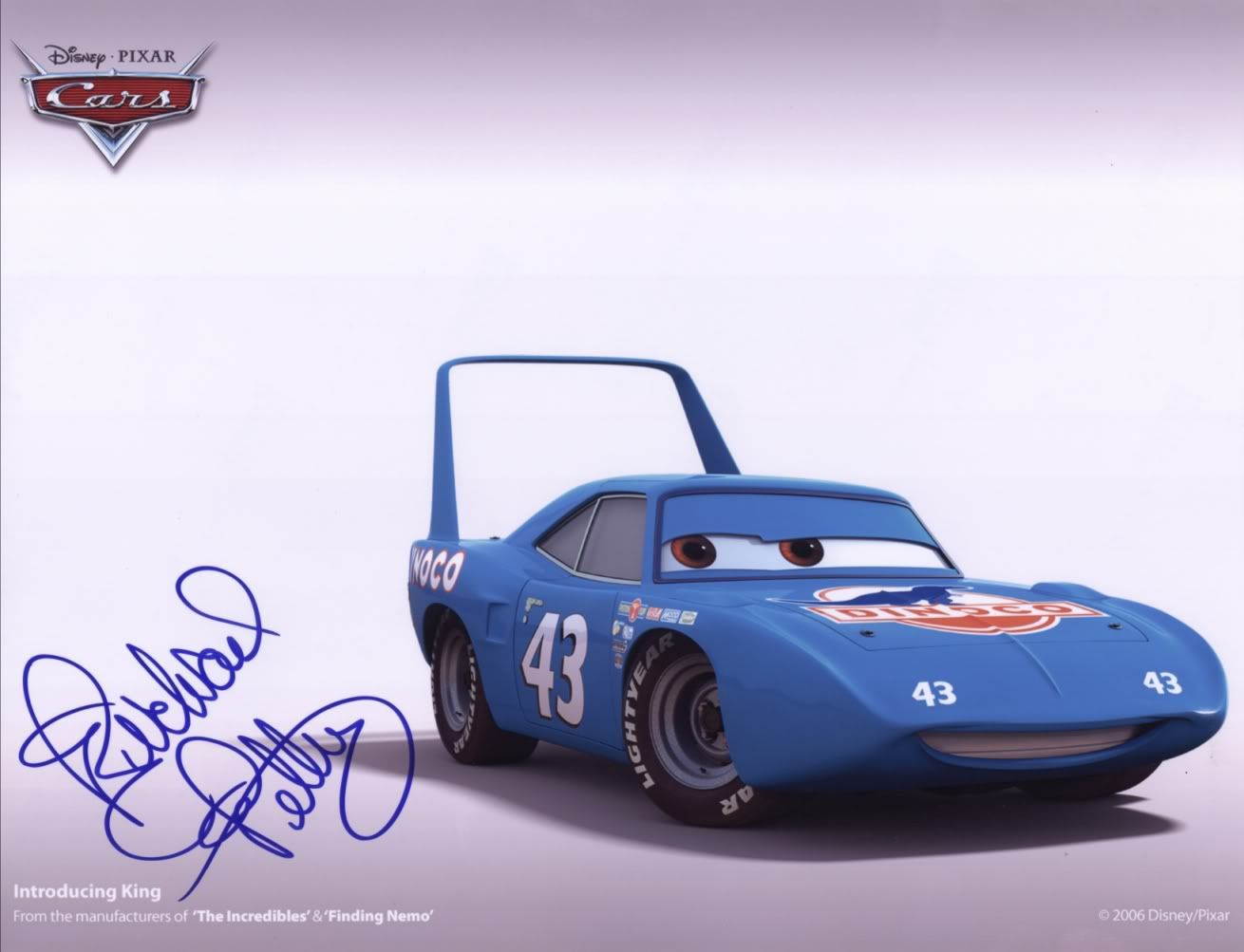
Petty won two more Daytona 500s in 1979 and 1981. In 1979, he snapped a 45-race drought, winning his sixth Daytona 500, the first to be televised live flag-to-flag; it would become notorious for a fistfight between competitors following the controversial finish. Petty won the race as the first and second place cars of Donnie Allison and Cale Yarborough crashed on the last lap.
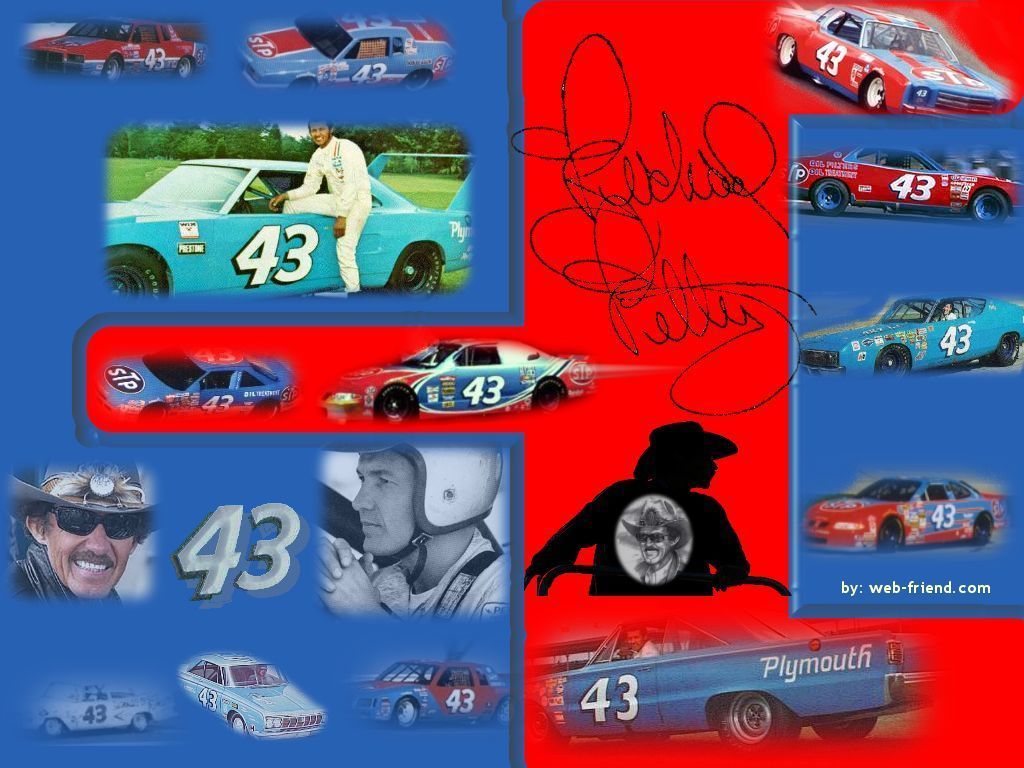
Petty held off Darrell Waltrip and A. J. Foyt. The race is also regarded as being the genesis of the current surge in NASCAR's popularity. The East Coast was snowed in by a blizzard, giving CBS a captive audience. The win was part of Richard's seventh and last NASCAR Winston Cup Championship. Petty was able to hold off Waltrip to win the title in 1979.

For 1981, NASCAR dictated that all teams had to show up with the new downsized cars of 110" wheel-base, that Detroit had been building since 1979. Though Petty had been successful with the Chevrolet and Oldsmobile cars he had been running, he wanted to get back to his Mopar roots.
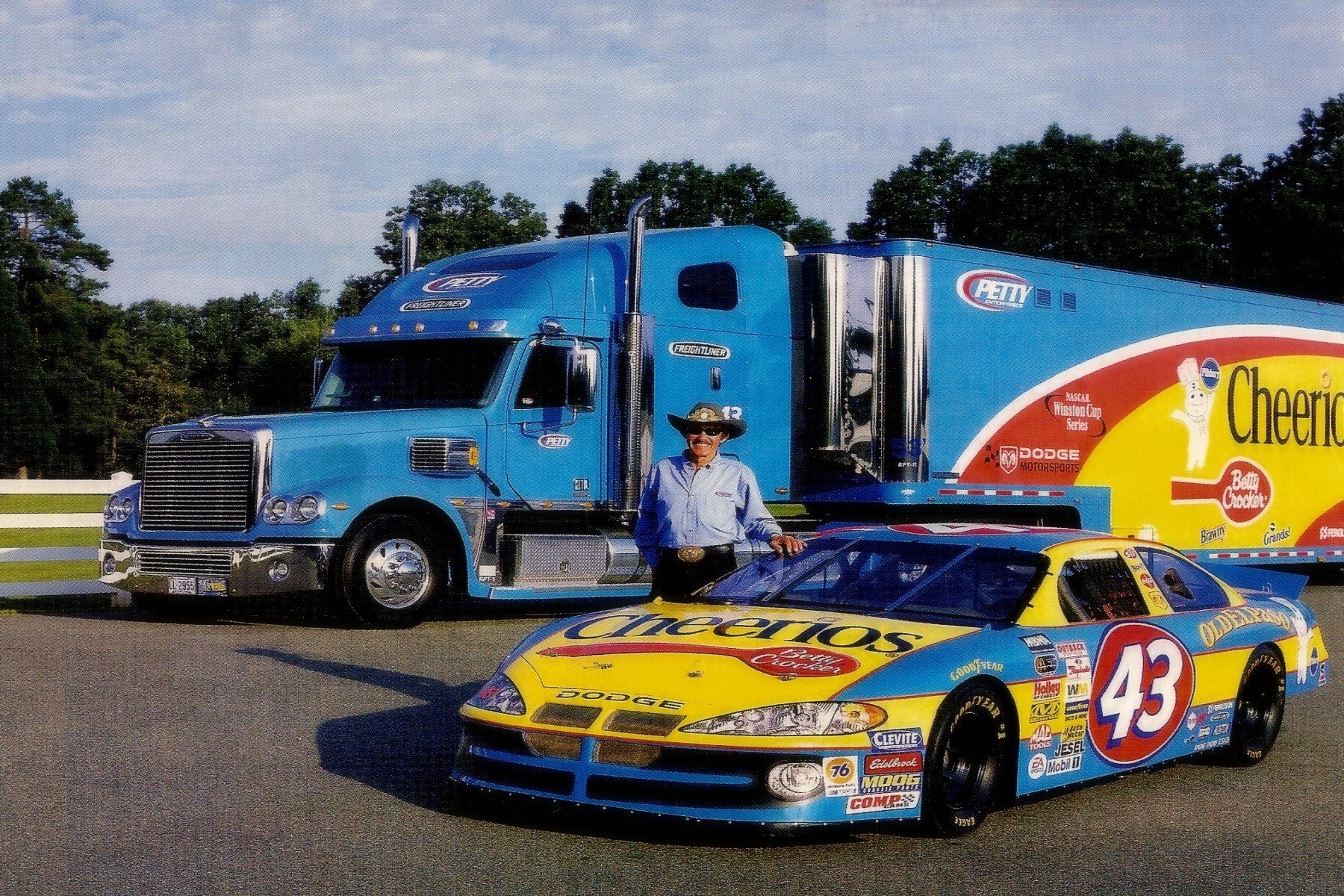
After taking a phone call from Lee Iacocca (who personally asked Petty to campaign a Dodge for 1981), the Petty team built a stunning 1981 Dodge Mirada and took it to Daytona in January 1981 for high speed tests.

Petty's fans were also in a large part fans of his Dodges, so when word got out about the Mirada testing, 15,000 or so showed up on 17 Jan 1981 at the Daytona Speedway to watch Petty put the Dodge through its paces.
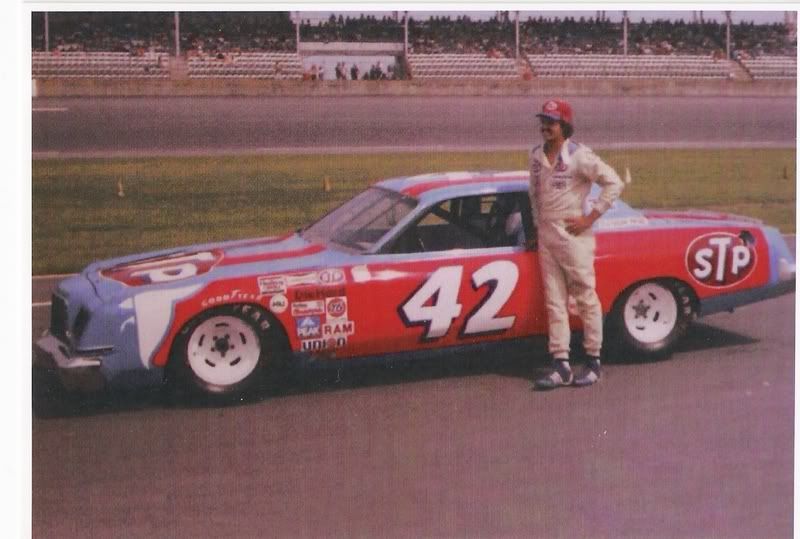
Sadly for the fans, the car could do no better than 186 miles per hour, about eight miles per hour slower than the GM and Ford cars. Petty gave up on returning to Dodge knowing that for the superspeedways the Mirada would not be competitive, and bought a Buick Regal for the Daytona race.

In the 1981 Daytona 500, Petty used a "fuel only" for his last pit stop, with 25 laps to go, to outfox Bobby Allison and grab his seventh and final Daytona 500 win. This win marked a large change in Petty's racing team. Dale Inman, Petty's longtime crew chief, left the team after the Daytona victory (Inman would win an eighth championship as crew chief in 1984 with Terry Labonte).

While the 1981 season brought Petty 3 wins, he felt the season was a failure, and the Regals being ill-handling and poor in reliability. For 1982 he made the move to the Pontiac Grand Prix, with the promise of substantial factory support from Pontiac.
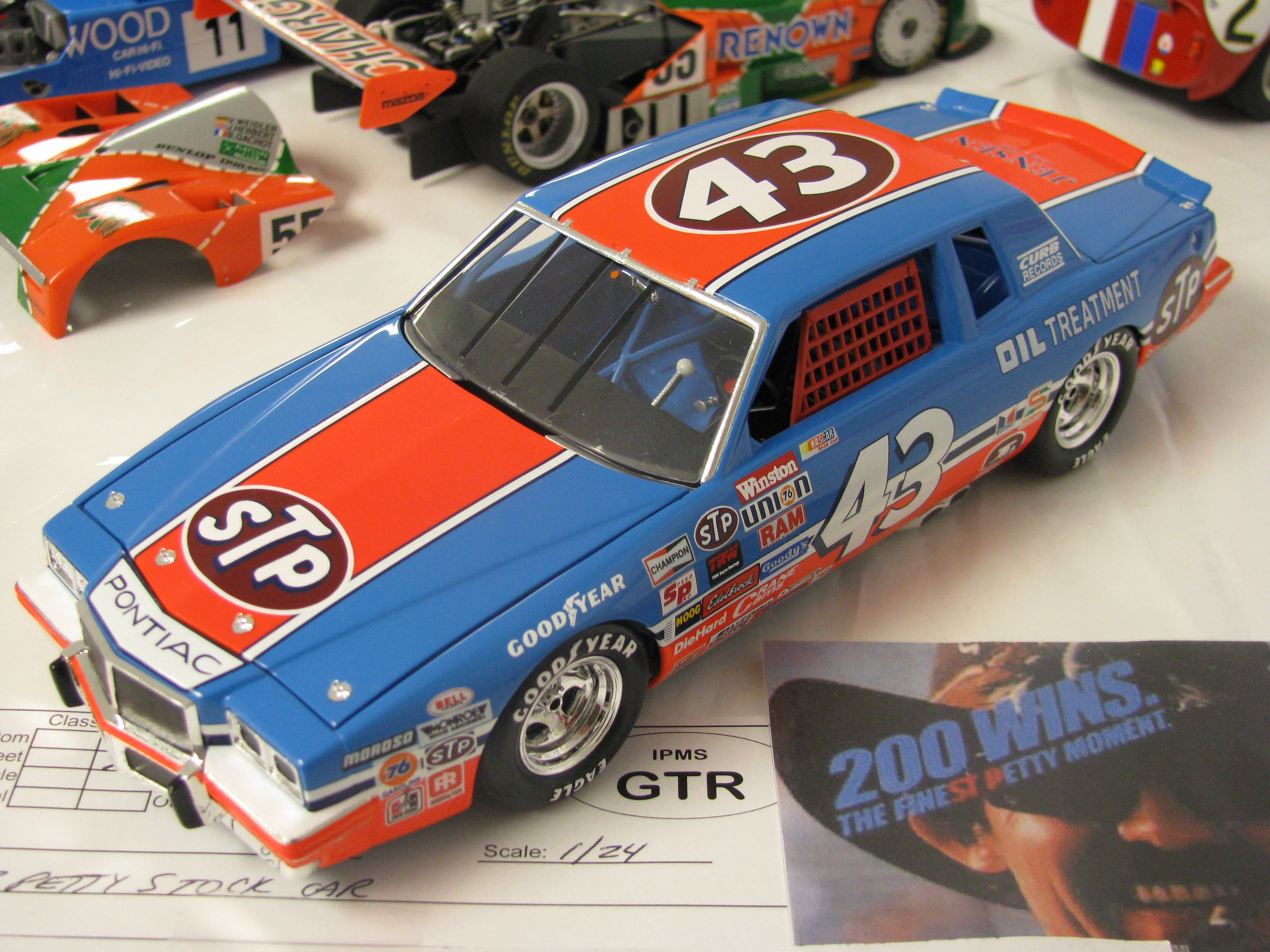
1982 was a repeat of 1978, and no victories were to be had. At first, the Grand Prix behaved much like the Dodge Magnum of 1978, with handling and speed problems. Toward the end of 1982 things improved with several top-10 finishes, which opened the door to a successful 1983 season with 3 victories, and several top-5 and top-10 finishes.
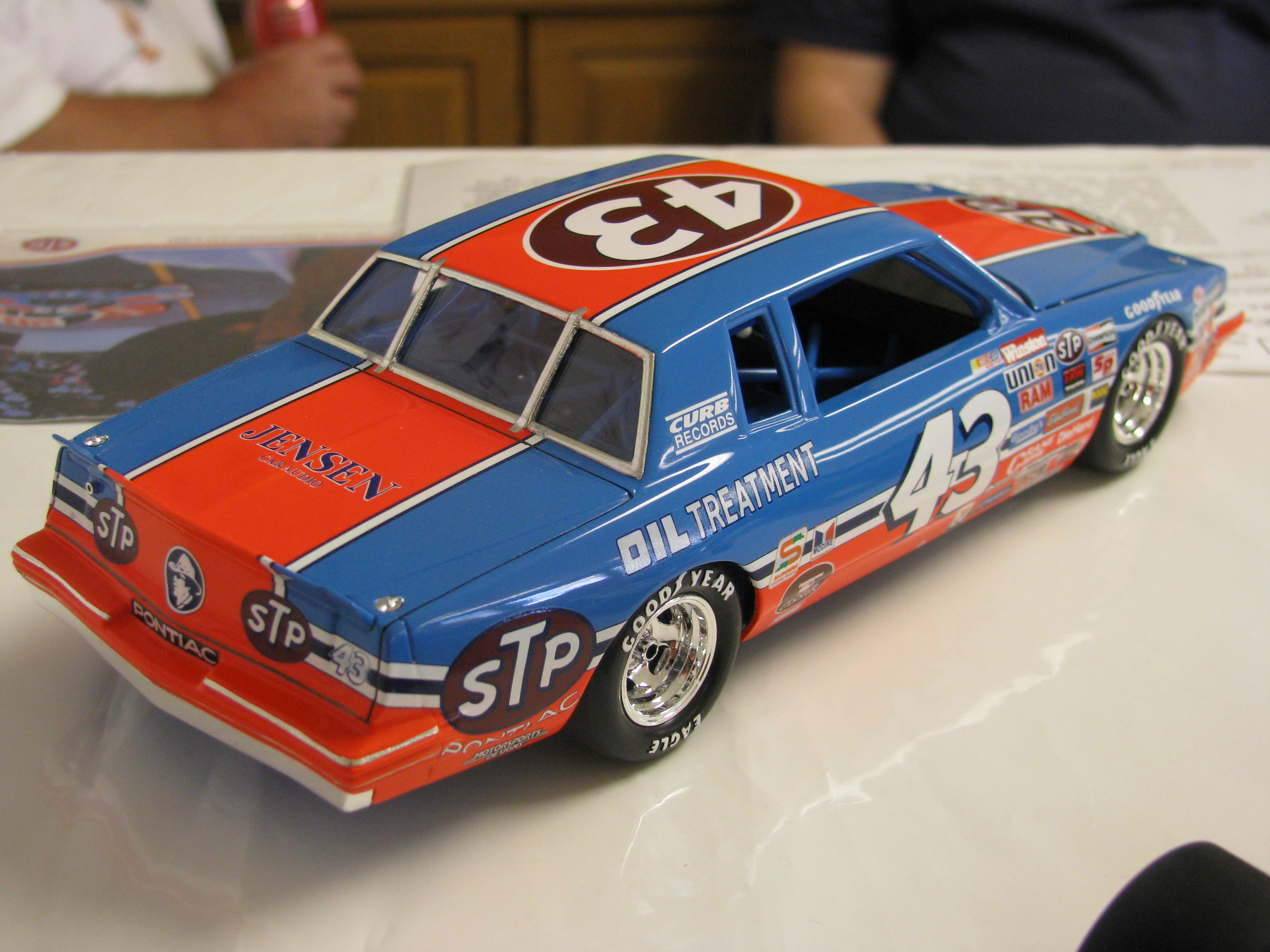
In 1983, he broke his 43 race winless streak from 1982 with a win in the 1983 Carolina 500, barely edging out a young Bill Elliott. After a controversial win at Charlotte in October 1983 (win No. 198), Petty left the race team his father founded for the 1984 season. He spent '84 and '85 driving for Mike Curb before returning to Petty Enterprises in 1986.

On July 4, 1984, Petty won his 200th (and what would turn to be his final victory) race at the Firecracker 400 at Daytona International Speedway. The race was memorable: On lap 158, Doug Heveron crashed, bringing out the yellow caution flag, essentially turning lap 158 into the last lap as the two drivers battled back to the start-finish line. Petty and Cale Yarborough diced it out on that lap, with Yarborough drafting and taking an early lead before Petty managed to cross the start/finish line only a fender-length ahead. (This is no longer possible because of the 2003 rule change freezing the field immediately upon caution. Furthermore, the green-white-checkered rule was created for if the yellow flag waves with two laps remaining, but not with one lap remaining.) President Ronald Reagan was in attendance, the first sitting president to attend a NASCAR race. Reagan celebrated the milestone with Petty and his family in victory lane.[10]

Petty's Last Ride
On October 1, 1991, Petty announced he would retire after the 1992 season. Petty's final top ten finish came at the 1991 Budweiser at the Glen which was the same race J. D. McDuffie was killed in a fifth lap accident. Petty chose to run the entire 1992 season, not just selected events as other drivers have done before retirement. His year-long Fan Appreciation Tour took him around the country, participating in special events, awards ceremonies, and fan-related meetings. Racing Champions ran a promotional line of diecast cars for every race in Petty's Farewell Tour. In his final year behind the wheel, he had two notable races.

At the 1992 Pepsi 400 on July 4, Petty qualified second. Before the start of the race, he was honored with a gift ceremony which included a visit from President George H. W. Bush. At the start, Petty led the first five laps, but dropped out on lap 84 due to fatigue.

Despite the tremendously busy appearance schedule, and mediocre race results, Petty managed to qualify for all 29 races in 1992. On his final visit to each track, Petty would lead the field on the pace lap to salute the fans. Petty's final race was the season-ending Hooter's 500 at Atlanta Motor Speedway. The race was notable in that it was the first career start for Jeff Gordon, and it was the 2nd closest points championship in NASCAR history, with six drivers mathematically eligible to win the championship. A record 160,000 spectators attended the race, which went down to the final lap with Bill Elliott winning the race, and Alan Kulwicki winning the championship by 10 points over Elliott after Davey Allison dropped out early after a crash.

Facing the intense pressure, Petty barely managed to qualify at Atlanta, posting the 39th fastest speed out of 41 cars. He would not have been eligible for the provisional starting position, and had to qualify on speed. On the 94th lap, Petty became tangled up in an accident, and his car caught fire. Petty pulled the car off the track, and climbed out of the burning machine uninjured. His pit crew worked diligently with less than 20 laps to go to get the car running again, and with two laps to go, Petty pulled out of the pits and was credited as running at the finish in his final race. He took his final checkered flag finishing in 35th position. After the race, Petty circled the track to salute the fans one final time in his trademark STP Pontiac.

The following year, he was back into a race car one more time. On August 18, 1993, NASCAR participated in a tire test at the Indianapolis Motor Speedway, in preparations for the 1994 Brickyard 400. Petty drove several laps around the track, and then donated his car to the Speedway's museum.
Petty would again step into a race car in 2003 on the week of the final race under the Winston banner at Homestead-Miami Speedway and took a solo lap honoring his seven Winston Cup Championships for Winston's salute to the champions.
In 2007 at the Pepsi 400 in Daytona, Petty was behind the wheel of a Daytona car during the pace laps, leading the field for the first lap. The field split him and he followed behind the field for one more pace lap before he pulled it in. This was in tribute to Bill France, Jr.
Career awards
On May 23, 2010 he was inducted into the first class of the NASCAR Hall of Fame.
In 1997, he was inducted into the International Motorsports Hall of Fame.
He was named one of NASCAR's 50 Greatest Drivers in 1998.
He was sole stock car representative in the first class inducted in the Motorsports Hall of Fame of America in 1989.
He was awarded the Medal of Freedom by President George Bush in 1992, the first motorsports athlete ever to be honored with this award.
Races won
Grand National/Winston Cup (200 career wins)
1984 (2 wins) Budweiser 500 (Dover), Firecracker 400 (Daytona)
1983 (3 wins) Warner W. Hodgdon Carolina 500 (Rockingham), Winston 500 (Talladega), Miller High Life 500 (Charlotte)
1981 (3 wins) Daytona 500 (Daytona), Northwestern Bank 400 (North Wilkesboro), Champion Spark Plug 400 (Michigan)
1980 (2 wins) Northwestern Bank 400 (North Wilkesboro), Music City USA 420 (Nashville)
1979 (5 wins) Daytona 500 (Daytona), Virginia 500 (Martinsville), Champion Spark Plug 400 (Michigan), CRC Chemicals 500 (Dover), American 500 (Rockingham), Winston Cup Championship
1977 (5 wins) Carolina 500 (Rockingham), Atlanta 500 (Atlanta), World 600 (Charlotte), NAPA 400 (Riverside), Firecracker 400 (Daytona)
1976 (3 wins) Carolina 500 (Rockingham), Purolator 500 (Pocono), American 500 (Rockingham)
1975 (13 wins) Richmond 500 (Richmond), Southeastern 500 (Bristol), Atlanta 500 (Atlanta), Gwyn Staley 400 (North Wilkesboro), Virginia 500 (Martinsville), World 600 (Charlotte), Tuborg 400 (Riverside), Firecracker 400 (Daytona), Champion Spark Plug 400 (Michigan), Delaware 500 (Dover), Wilkes 400 (North Wilkesboro), National 500 (Charlotte), Volunteer 500 (Bristol), Winston Cup Championship
1974 (10 wins) Daytona 500 (Daytona), Carolina 500 (Rockingham), Gwyn Staley 400 (North Wilkesboro), Music City USA 420 (Nashville), Motor State 360 (Michigan), Dixie 500 (Atlanta), Purolator 500 (Pocono), Talladega 500 (Talladega), Capital City 500 (Richmond), Delaware 500 (Dover), Winston Cup Championship
1973 (6 wins) Daytona 500 (Daytona), Richmond 500 (Richmond), Gwyn Staley 400 (North Wilkesboro), Alamo 500 (College Station), Capital City 500 (Richmond), Old Dominion 500 (Martinsville)
1972 (8 wins) Winston Western 500 (Riverside), Richmond 500 (Richmond), Gwyn Staley 400 (North Wilkesboro), Virginia 500 (Martinsville), Lone Star 500 (College Station), Capital City 500 (Richmond), Old Dominion 500 (Martinsville), Wilkes 400 (North Wilkesboro), Winston Cup Championship
1971 (21 wins*) Daytona 500 (Daytona), Richmond 500 (Richmond), Carolina 500 (Rockingham), Hickory 276 (Hickory), Columbia 200 (Columbia), Maryville 200 (Maryville), Gwyn Staley 400 (North Wilkesboro), Virginia 500 (Martinsville), Asheville 300 (Asheville), Pickens 200 (Greenville), Albany-Saratoga 250 (Malta), Islip 300 (Islip), Northern 300 (Trenton), Nashville 420 (Nashville), Dixie 500 (Atlanta), West Virginia 500 (Ona), Sandlapper 200 (Columbia), Delaware 500 (Dover), American 500 (Rockingham), Capital City 500 (Richmond), Texas 500 (College Station), Grand National Championship.
There is a disputed win that is not included in the total, the 1971 Myers Brothers 250 Grand American-Grand National combination race at Bowman Gray Stadium. Bobby Allison in a Grand American car win the race, Petty finished second in a Grand National car, thereby winning the division. Neither driver is officially credited with a Grand National (now Sprint Cup) win. Under current rules in combination races, which currently exist in the current K&N Pro Series (Petty has four wins in the K&N Pro West Series when it was administered differently than it is today) and Grand American Road Racing Association, teams that finish first in class of teams entered in each series being contested in the same race (East Series and West Series for the K&N Pro, DP, GT, and GX in Grand-Am) are each credited with class wins in their divisions.
1970 (18 wins) Carolina 500 (Rockingham), Savannah 200 (Savannah), Gwyn Staley 400 (North Wilkesboro), Columbia 200 (Columbia), Falstaff 400 (Riverside), Kingsport 100 (Kingsport), Albany-Saratoga 250 (Malta), Schaefer 300 (Trenton), East Tennessee 200 (Maryville), Dixie 500 (Atlanta), West Virginia 300 (Ona), Myers Brothers 250 (Winston-Salem), Halifax County 100 (South Boston), Capital City 500 (Richmond), Mason-Dixon 300 (Dover), Home State 200 (Raleigh), Old Dominion 500 (Martinsville), Georgia 500 (Macon)
1969 (10 wins) Georgia 500 (Macon), Motor Trend 500 (Riverside), Virginia 500 (Martinsville), Kingsport 250 (Kingsport), Mason-Dixon 300 (Dover), Maryland 300 (Beltsville), Nashville 400 (Nashville), Smoky Mountain 200 (Maryville), Myers Brothers 250 (Winston-Salem), Old Dominion 500 (Martinsville)
1968 (16 wins) Race 02 (Montgomery), Hickory 250 (Hickory), Greenville 200 (Greenville), Asheville 300 (Asheville), Race 21 (Maryville), Race 22 (Birmingham), Pickens 200 (Greenville), Maine 300 (Oxford), Fonda 200 (Fonda), Smoky Mountain 200 (Maryville), Race 37 (South Boston), Capital City 300 (Richmond), Hillsboro 150 (Hillsboro), Old Dominion 500 (Martinsville), Wilkes 400 (North Wilkesboro), American 500 (Rockingham)
1967 (27 wins) Augusta 300 (Augusta), Fireball 300 (Weaverville), Columbia 200 (Columbia), Hickory 250 (Hickory), Virginia 500 (Martinsville), Richmond 250 (Richmond), Rebel 400 (Darlington), Tidewater 250 (Hampton), Macon 300 (Macon), East Tennessee 200 (Maryville), Carolina 500 (Rockingham), Pickens 200 (Greenville), Northern 300 (Trenton), Race 31 (Fonda), Islip 300 (Islip), Volunteer 500 (Bristol), Nashville 400 (Nashville), Myers Brothers 250 (Winston-Salem), Sandlapper 200 (Columbia), Race 39 (Savannah), Southern 500 (Darlington), Buddy Shuman 250 (Hickory), Capital City 300 (Richmond), Maryland 300 (Beltsville), Hillsboro 150 (Hillsboro), Old Dominion 500 (Martinsville), Wilkes 400 (North Wilkesboro), Grand National Championship
1966 (8 wins) Georgia Cracker 300 (Augusta), Daytona 500 (Daytona), Rebel 400 (Darlington), Tidewater 250 (Hampton), Speedy Morelock 200 (Macon), Fireball 300 (Weaverville), Nashville 400 (Nashville), Dixie 400 (Atlanta)
1965 (4 wins) Nashville 400 (Nashville), Western North Carolina 500 (Weaverville), Buddy Shuman 250 (Hickory), Race 48 (Manassas)
1964 (9 wins) Sunshine 200 (Savannah), Daytona 500 (Daytona), Race 24 (South Boston), Race 29 (Concord), Music City 200 (Nashville), Race 34 (Spartanburg), Nashville 400 (Nashville), Mountaineer 500 (Huntington), Race 60 (Harris), Grand National Championship
1963 (14 wins) Race 02 (Tampa), Race 08 (Spartanburg), Race 09 (Weaverville), South Boston 400 (South Boston), Virginia 500 (Martinsville), Gwyn Staley 400 (North Wilkesboro), Columbia 200 (Columbia), Race 24 (Manassas), Race 27 (Birmingham), Race 36 (Bridgehampton), Pickens 200 (Greenville), Sandlapper 200 (Columbia), Race 51 (Randleman), South Boston 400 (South Boston)
1962 (8 wins) Gwyn Staley 400 (North Wilkesboro), Virginia 500 (Martinsville), Pickens 200 (Greenville), Race 39 (Huntsville), Race 41 (Roanoke), International 200 (Winston-Salem), Race 43 (Spartanburg), Wilkes 320 (North Wilkesboro)
1961 (2 wins) Richmond 200 (Richmond), World 600 Qualifier #1 (Charlotte)
1960 (3 wins) Race 06 (Charlotte), Virginia 500 (Martinsville), Race 39 (Hillsboro)
1959 (0 wins) Rookie of the Year

Source
en.wikipedia.org/wiki/Richard_Petty


